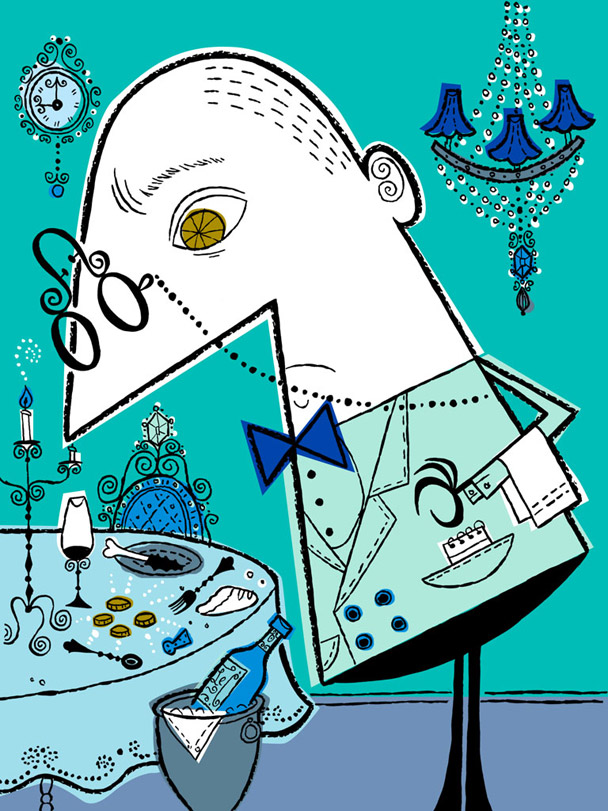“Alright, everybody cough up some green.”
It’s the opening scene of Quentin Tarantino’s contemporary classic, 1994’s über-violent heist flick Reservoir Dogs. The late Chris Penn as Nice Guy Eddie“ the son of the man coordinating the suited bank-robbers-to-be at the table—is calculating the tip after their pre-diamond-robbery coffee shop breakfast. He realizes that Steve Buscemi’s character, a robber we only know by his code name, Mr. Pink, hasn’t tipped. “Come on, throw in a buck,” says Nice Guy Eddie. Mr. Pink leans back, looks at Penn, and delivers the now-classic line:
“Uh-uh. I don’t tip.”
Eddie, stunned: “You don’t tip?”
“Nah, I don’t believe in it.”
“You don’t believe in tipping?”
What follows is a fairly off-color conversation it would be better not to rehash—though it graphically notes what the waitress could do to earn “over twelve percent”—but the basic tenet of Mr. Pink’s philosophy-cum-tirade can be found in one of the only non-expletive-laced lines in it:
“This tipping automatically, that’s for the birds. As far as I’m concerned, they’re just doing their job.”
Mr. Pink’s in the minority at the table. He’s shouted down and eventually throws down his dollar. Yet over a decade and a half later, he’s as not-wrong as he was then. In fact, less so: the problems with this unspoken yet seemingly obligatory social norm have only grown since.
How so? Tipping in its current form is an assault on fairness for employers and employees as well as consumers’ rights. It reinforces an economically and socially dangerous status quo, while buttressing a functional aristocracy. Oh, yeah: it’s also often a racist, superficial practice and yet, like capital punishment and gun ownership, America is one of the last industrialized nations in the world still desperately holding on to it.
How did we get to the point where anything less than the standard for gratuity—15%—is widely considered déclassé, and anything less than 10%—no matter how abominable the service—might get you chased down the street by a waiter long after you’ve walked away from your table? Why are consumers categorically obligated—though not technically forced—to compensate for the failure of employers and our government at-large to ensure fair compensation? Does it really take more skill to serve a $100 dish than a $20 dish, and should it really fall on the customer to pay no matter how poorly that dish gets served?
Tipping needs to die. But like, say, gun ownership, capital punishment, and the abolition of slavery, it’s a taboo topic reserved for mostly quiet, closeted, theoretical discussions nobody’s willing to take seriously. It’s difficult to take a position against tipping without being labeled a fascist hate monger. Its historical advocates have been few and far between (though, for whatever it’s worth, U.S. President William Howard Taft and Ralph Waldo Emerson were also vehemently anti-tipping, so Mr. Pink and I aren’t completely alone).
Sitting at the bar of a neighborhood bistro one night in Brooklyn, I pitched this piece on Jeff, a friend, and the chef-owner of the restaurant: “Ending tipping? Man. I don’t know.” Jeff slowly backed away. “Just talking about it makes me feel weird,” he mumbled, shortly before disappearing into the kitchen. I didn’t see him for the rest of the night. And of course, I left 20%.
Not that it wasn’t deserved, but: the exchange wasn’t fair for either of us. That’s the point.
To understand how tipping got here, a little bit of history might be on the menu. The etymology of tipping is just as widely misunderstood as the practice itself. It’s commonly accepted that the origin of “tipping” or “tip” comes from the British (who eschew tipping more than we do) in the early 19th century, who used to hang signs in pubs with the word “TIP” as an acronym of “To Insure Promptitude,” when in fact, it actually first appeared as a verb in George Farquhar’s 1707 The Beaux’ Stratagem after being used in criminal circles as a word meant to imply the unnecessary and gratuitous gifting of something somewhat taboo, like a joke, or a sure bet, or illicit money exchanges. That feeling of being robbed by having to tip for bad service? Now you know: the word tipping came from criminals.



 Pinterest
Pinterest


